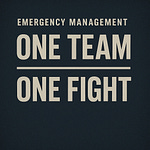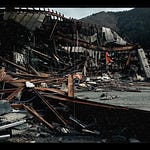In the contemporary epoch, characterized by escalating environmental uncertainties and rapidly changing weather patterns, disaster management has come under the spotlight. A key aspect of effective disaster management is cultivating a 'culture of preparedness,' a societal framework that prioritizes readiness and proactive action to confront natural and man-made disasters. Let’s explore the role of emergency managers in facilitating the establishment and growth of a preparedness culture.
Emergency managers play a vital role in building resilience within communities. Our position allows us to guide the design and execution of comprehensive disaster response strategies that ensure safety, minimize damages, and expedite recovery. However, our influence extends beyond reactionary measures. We also function as leaders in initiating a shift in societal perceptions and behaviors toward recognizing the importance of preparation and foresight.
We are responsible for educating communities about potential threats, their implications, and the measures that can be taken to mitigate risk. Through various platforms such as public forums, workshops, and digital communication, we can demystify complex aspects of disaster management, making it accessible and understandable to all. The effectiveness of these educational efforts is amplified when tailored to the specific vulnerabilities of a given community, thereby fostering a localized culture of preparedness.
We must create and reinforce a collaborative framework that encourages interagency cooperation and public participation. We can cultivate an environment of shared responsibility by facilitating partnerships among governmental bodies, non-governmental organizations, local businesses, and the community. This approach enhances resource mobilization, diversifies expertise, and ultimately strengthens the culture of preparedness.
Additionally, our profession can be critical in improving public trust in institutions and first responders. Regular communication, transparency, and capability demonstration can reassure the public that responsible entities are prepared to respond effectively when disasters strike. This assurance can inspire confidence in individuals to take preparatory actions themselves, thus further embedding the culture of preparedness.
It is incumbent upon us to advocate for policy initiatives that promote preparedness. This could include pushing for infrastructure investments that can withstand severe weather events, supporting legislation that mandates safety standards, or endorsing educational programs in schools that teach disaster preparedness from an early age. By shaping policy, emergency managers can institutionalize the culture of preparedness, ensuring its longevity and impact.
A recent survey conducted by Motorola has made a pivotal contribution to our understanding of public perceptions and responses to severe weather events and the degree to which residents of the United States feel prepared for these incidents. The responses show a growing public consciousness and anxiety regarding the implications of such events while concurrently revealing gaps in personal readiness. The impact of these findings is potentially profound, particularly for emergency management, which is tasked with developing strategies to protect communities from such crises.
Todd Piett, Vice President of Rave Mobile Safety at Motorola Solutions, brings attention to the relentless cycle of severe weather events that pose constant challenges to citizens and experienced emergency management personnel in the public and private sectors. This survey serves as a clarion call for the public and emergency professionals alike to revisit their disaster response and preparedness plans, adapting them to align with the evolving threat landscape.
A multitude of significant findings surfaced from this study. About two-thirds of respondents (66%) reported having to forgo work due to a severe weather event or natural disaster. Also, an alarming 40% confessed to experiencing difficulties accessing essential commodities during such instances. Even as 86% of the respondents expressed alarm about the escalating intensity and frequency of natural disasters, merely 36% felt ready to face a significant weather event. Interestingly, most respondents leaned more towards first responders than their resources, with a high 93% exhibiting faith in their community's first responders during a crisis.
Communication in times of disaster is another critical area brought to light by this survey. 34% of respondents preferred text messages, while 32% found mobile safety app alerts from state or local officials more appealing. The number of individuals using online safety profiles or registries to communicate with public safety officials has nearly doubled from 18% the previous year to 35%. Encouragingly, 67% reported taking proactive steps to prepare for a disaster by assembling a safety kit, 57% had signed up for local emergency notifications, and almost half (47%) had developed an evacuation or family preparedness plan.
Emergency managers must heed the implications of these findings. As the public consciousness of severe weather events and disaster preparedness continues to amplify, the insights provided by this study can be indispensable in tailoring more targeted, effective emergency management strategies. The dependence on emergency communication channels underlines the need to ensure reliable and efficient information dissemination during crises. Furthermore, the substantial trust placed in first responders presents a valuable opportunity for emergency managers. This trust can be harnessed to build stronger community relationships, improve public education on disaster preparedness, and persistently enhance their capacity to respond to disasters.
The survey, conducted in May 2023 by independent market research firm Researchscape, highlights the shifting trends in public perception and preparedness in the face of extreme weather events. It is a critical tool for public and private sector entities to reassess their current approaches, refine their strategies, and better equip themselves to protect and assist their communities in these increasingly challenging times.
Emergency managers are pivotal in instilling a culture of preparedness within communities. Their role encompasses education, collaboration, trust-building, and policy advocacy, all of which contribute significantly to a society that values and practices readiness. Amid a global climate of increasing disaster risk, the influence of emergency managers in promoting a culture of preparedness is not just advantageous but essential. By investing time and resources in fostering this culture, we can better protect our communities, minimize the impact of disasters, and expedite recovery when they do occur.















Share this post